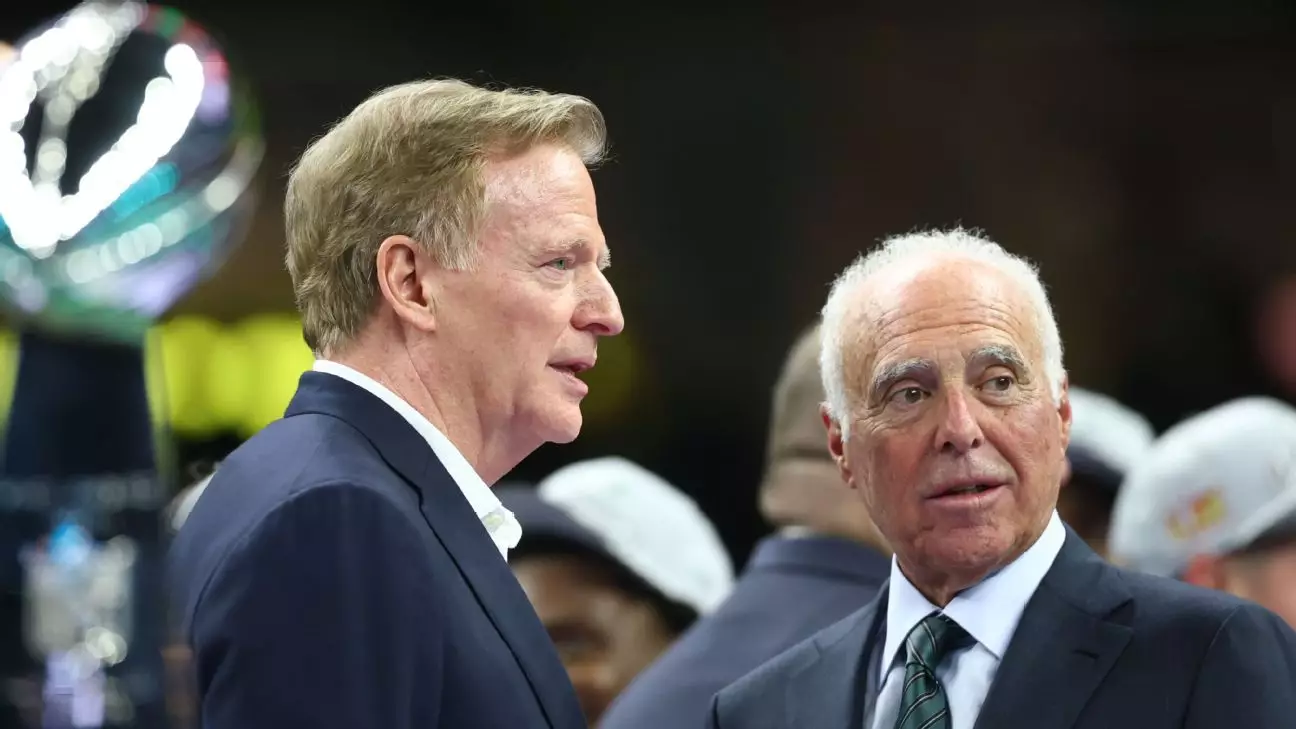In the hallowed halls of the NFL, where decisions that shape the very fabric of American football are made, tension simmered to a boil during the most recent league meeting in Eagan, Minnesota. The debate centered around a seemingly innocuous play known as the “tush push,” yet what transpired was anything but trivial. This event highlights not merely the mechanics of football tactics but also underscores the delicate balance of power and values within the NFL’s hierarchy.
Philadelphia Eagles owner Jeffrey Lurie took center stage in a passionate defense of this controversial play. It’s fascinating how a single maneuver can provoke such fervent debate among the league’s elite. Was Lurie’s sense of urgency a genuine concern for the integrity of the game, or was it a strategic ploy to protect his team’s edge in a competitive landscape? The mere thought of the tush push being banned spurred him into action, and the stakes couldn’t have been higher.
More Than Just a Play: The Symbolism of the Tush Push
Lurie’s argument transcended the boundaries of traditional football discourse. By likening the creation of this play to a “wet dream for a teenage boy,” he evoked a visceral reaction in the room. While some may have taken offense at his crude metaphor—especially in a gathering that included women—it illustrated a deeper truth: the kinship between creativity and competition in sports. The tush push represents a dazzling moment of innovation that not only invigorates the game but also poses questions about the boundaries of acceptable play.
But what does such a comment reveal about the culture within the NFL? It suggests that the masculine bravado that often encapsulates professional sports runs deeper than game strategy. In a league grappling with issues of inclusivity and representation, Lurie’s unrestrained rhetoric raises alarm bells about the values that underpin the NFL’s decision-making ethos. Is the NFL a bastion of progress, or is it a reflection of a bygone era, clinging to outdated norms?
Power Plays and Political Maneuvering
The exchange between Lurie and NFL executives, including Commissioner Roger Goodell and Executive Vice President Troy Vincent, was not merely about a play; it was a theater of power dynamics at play. Lurie’s call to action aimed to rally other owners in defense of a tactic that has become a hallmark of his team’s success. But the response from figures like Vincent—who criticized Lurie’s choice of words—indicates an underlying discomfort with not only the content of his argument but the tone in which it was delivered.
The tension in the room was palpable, especially when figures like Dallas Cowboys owner Jerry Jones and Buffalo Bills owner Terry Pegula entered the fray. The juxtaposition of their opinions illustrates the NFL’s fractious nature. It is a league where alliances are as telling as the plays on the field; where the opinions of a few can dictate the fate of a play that has changed competitive dynamics.
Ultimately, the fact that the ban on the tush push failed to pass—falling two votes short at 22-10—highlights a critical moment in the league’s decision-making processes. It begs the question of whether the NFL is ready to embrace a new era of football that celebrates innovation and acknowledges the complexities of player safety, even at the risk of traditionalism.
The Future of Football and Societal Reflection
The tussle over the tush push serves as a microcosm of larger societal debates: innovation versus tradition, safety versus aggression, and inclusivity versus exclusion. The NFL stands at a crossroads, wrestling with how to evolve while preserving its rugged identity. In an era where sports can be a unifying force or a divisive one, the implications stretch beyond the gridiron.
As the league continues to navigate these turbulent waters, the outcomes of such discussions will shape not only the future of football but also the cultural discourse surrounding sports. Will the NFL emerge as a model for progressive values, or will it remain mired in a past that no longer resonates with the evolving landscape of American society? The answer may lie in how it responds to challenges like the tush push debate, a reflection of its willingness to adapt and grow.

